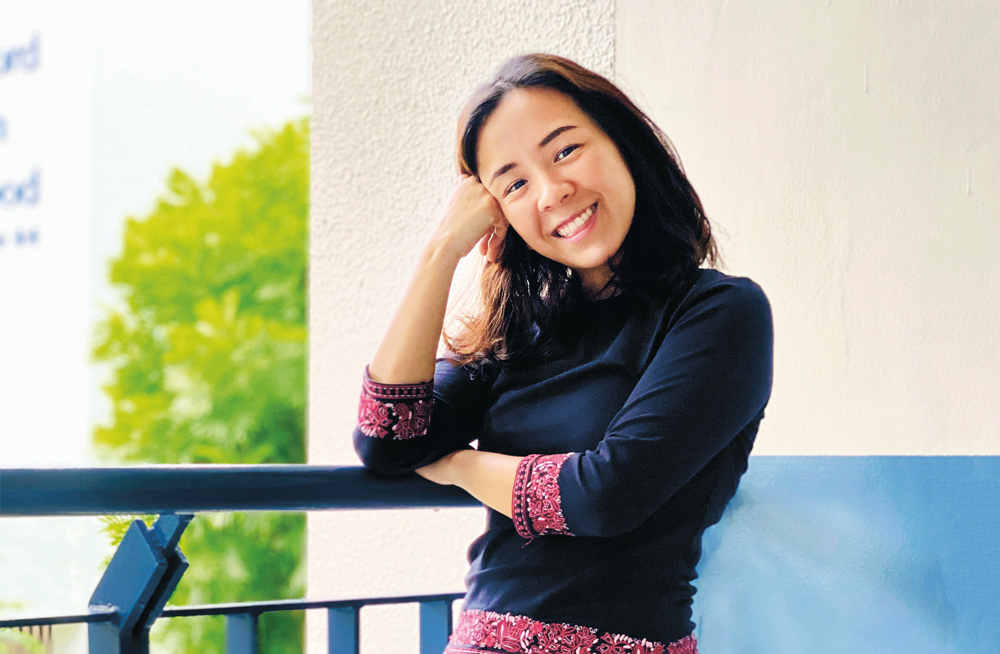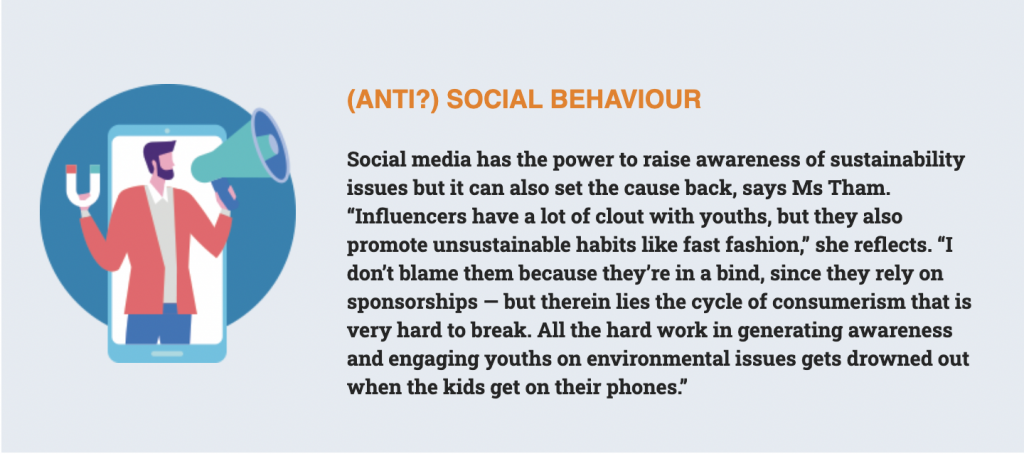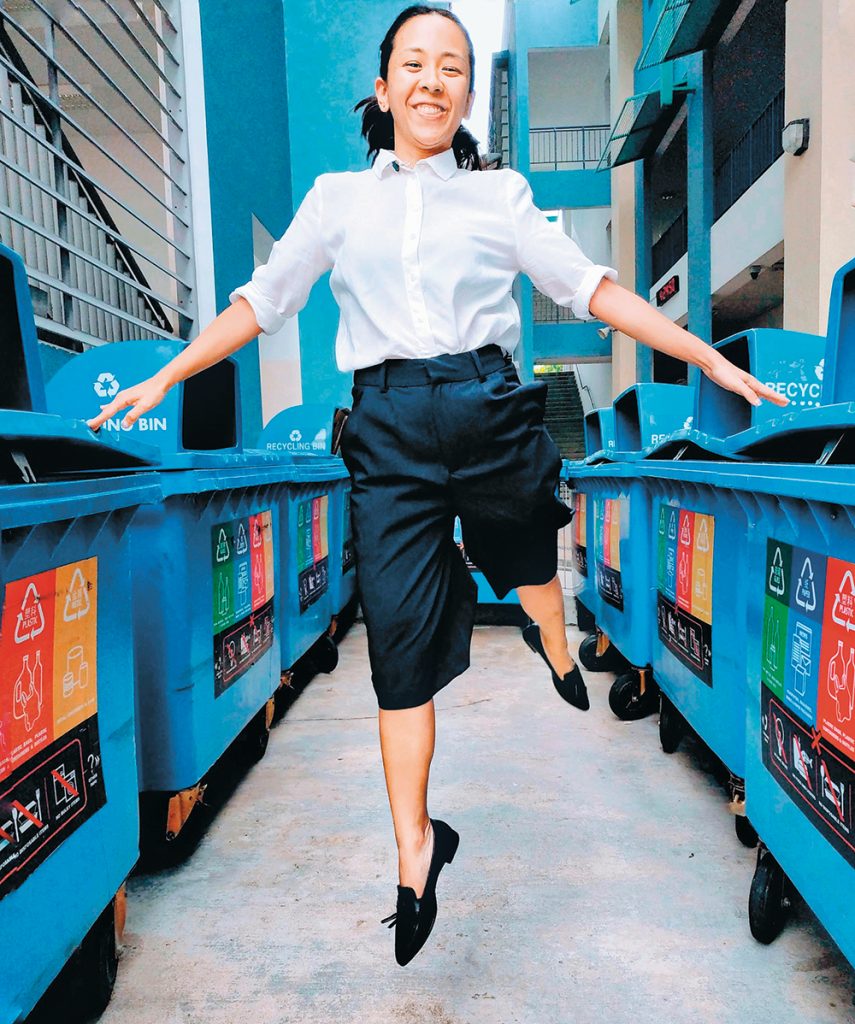Championing Conscious Consumerism
November 2, 2021
IN BRIEF | 4 min read
-
Ms Bianca Tham (NUS English Language & Literature and University Scholars Programme, ’17) isn’t naive about the impact she can make on the environment — but that doesn’t curb her enthusiasm one bit.

820 million — that’s how many plastic bags are used in Singapore’s supermarkets every year, according to a study by the Singapore Environment Council. Rising against this seemingly endless tsunami of polyethylene is Ms Bianca Tham (Arts and Social Sciences ’17), who makes it a point to bring her own reusable bag when getting groceries. But how then will we throw away our trash (the other big use of supermarket plastic bags), we ask her, using a question often lobbed at environmentalists. “We have to get creative,” suggests Ms Tham, 27. “I have a rule at home: no wasting of other kinds of plastic bags. So everything from bread bags to the large plastic bags that toilet rolls come in — they can all be used to throw away trash.”
In the grand scheme of things, it may be argued that the impact Ms Tham is making is negligible — after all, even if she were to make 365 trips to the supermarket every year, she would only save about 1,000 bags, which barely makes a dent. And all the good work she does is sometimes negated by her own mother, who admits to taking the occasional plastic bag for its convenience. But Ms Tham is not one to be easily discouraged. “It’s coming from a place of principle: as a consumer, I don’t want my purchases to affect our environment negatively. I don’t let myself be affected by how big or small the impact I am making is — if I were, I would be discouraged every time I went down to the recycling bin since it’s often contaminated with non-recyclables. But I still recycle religiously because I want to be the change I want to see.”

AN ONGOING JOURNEY
This principle of conscious consumerism continues a journey that began for Ms Tham in secondary school, when she saw videos of how animals were used to test cosmetic products. “I steered clear of those companies but as I grew up, I learnt that every industry has an unethical side that I did not want to support,” says Ms Tham, a Social Studies teacher.
That discovery prompted her to consider not just what she bought but also how much she bought. “I was a shopaholic,” she admits, revealing that she would buy clothes, seemingly in autopilot mode, whenever she stepped into a mall. Disturbed by this, she decided to quit shopping for a year, going cold turkey during her university days. “It was painful but that one year made me so mindful of my habits. I also became mindful of the brands around us — I did some research and found that I did not want to be supporting them because of their labour and environmental practices.”
She adds that it can be challenging to be a discerning consumer in today’s climate, as corporates can “greenwash” themselves to appear more sustainable than they actually are. “So if you’re going to base your decisions on a slogan or an ad they have, don’t,” she says. “Read up on their mission statements and environmental impact reports to make sure they really are as sustainable as they claim to be.” This means sometimes buying goods that are more expensive — but she is fine with this as she values knowing just what her money is going towards.

RALLYING HER PEERS
Ms Tham stresses that being a discerning buyer does not have to be an expensive or lonely pursuit. She championed “freeganism” during her time at NUS, going so far as to run an event devoted to it. Her belief in the ‘power of free’ led to the creation of a ‘free market’ during her undergraduate days, where NUS students and staff could share their talents, skills and goods with the community for free. That event, aptly titled ‘Laissez Faire’, remains a highlight of the University Scholars Programme calendar.
Ms Tham has also gained notoriety for being a “dumpster diver” — which refers to the act of digging through trash to find goods that can still be used. One of her most prized finds is a glass bowl she found in a dustbin near her home. Describing it as being perfect “except for a thin film of dust”, she uses it as a fruit bowl in her home today. “But only after we gave it a thorough wiping down,” she adds quickly.

NEW ARENAS OF CHANGE
These days, Ms Tham admits that the demands of work make it difficult for her to meaningfully engage in activities like dumpster diving. Still, she finds opportunities to make a difference wherever she can — which is more often than not in the classroom. “Today’s Social Studies curriculum encourages teachers to discuss current affairs like sustainability. Character and Citizenship Education classes also allow me to do this,” she explains.
Being an educator for the past three years has shown her that Gen-Z may not be as eco-friendly as they are sometimes made out to be. “I’ve heard that notion before,” she shares. “But in reality, they are still very driven by trends. For example, there was a period when reusable straws and food containers were very popular because of influencers on TikTok. But when that trend died down, students gradually reverted to using disposables again.”
Despite this, Ms Tham’s can-do spirit continues to shine as she seeks to build the same love for the environment that today’s young share for TikTok dance crazes and memes. She looks for creative solutions to tackle these issues: for instance, in 2019, she engaged Swapaholic, an e-commerce platform that allows users to swap clothes, to run a lecture for her students. “They were really engaged and saw that there are alternatives to the ‘buy, buy, buy’ lifestyle we are used to,” she reflects. Her career in education also allows her to pursue a lifelong passion for interacting with youths. “I get energised by them,” she says. “I grew up in a single-parent household, so I especially empathise with youths from vulnerable backgrounds. I want to give them options in life by being a parent away from home for them, guiding them as they go through their education.”
Text by Keenan Pereira. This story first appeared in The AlumNUS (Issue 127, Oct-Dec 2021).

